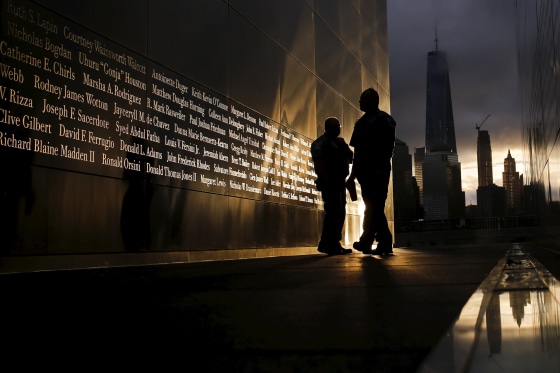The newly declassified “28 pages” of a Congressional inquiry into the 9/11 attacks were made public Friday, offering a fresh glimpse of long-held suspicions -- but no smoking-gun proof -- of direct Saudi government connections to the al Qaeda terrorists who carried out the plot.
“While in the United States, some of the hijackers were in contact with, and received support or assistance from individuals who may be connected to the Saudi government,” the report says.
A later inquiry by the 9/11 Commission found no evidence of Saudi government involvement in the attacks, but many people remain unconvinced. The Saudi government denies any role.
“There is zero evidence of any Saudi official acting as an agent of the state in support of the 9/11 (or any terrorist) act,” a Saudi-funded American public relations firm said in a statement.
Though the report doesn’t show a direct Saudi government role in the 9/11 attacks, it is exceedingly unflattering for a country that has long been one of the U.S.’s closest Middle East allies. It paints a portrait of a time, now 15 years in the past, when Saudi-funded charities supported al Qaeda, Saudi government officials traveled around the U.S. in the company of known extremists, and FBI officials complained that the Saudi government obstructed terror investigations.
The Obama administration also released on Friday a 2005 joint report by the CIA and FBI that offered a more nuanced conclusion: No evidence of Saudi government involvement in 9/11, but plenty of support from Saudi officials and entities to individuals tied to terrorist organizations.
CLICK HERE TO READ THE 28 PAGES
It is no secret that many individual Saudis hold al Qaeda sympathies – 15 of the 19 hijackers were Saudi, after all. It is also well known that the Saudi government has long funded mosques and other institutions around the world that promote an austere, anti-Western and what many consider extremist brand of Islam.
The Congressional report discusses Saudis with al Qaeda sympathies in the U.S., and Saudi-funded mosques promoting extremism, but says the FBI was collecting no intelligence about any of that before 9/11 because Saudi Arabia was considered an ally.
The Congressional officials who released the report, after a long campaign by some current and former lawyers and some families of 9/11 victims, urged readers to consider the full context.
Rep. Devin Nunes (R. - Calif.), chairman of the House intelligence Committee, said, “It’s important to note that this section does not put forward vetted conclusions, but rather unverified leads that were later fully investigated by the Intelligence Community.”
Rep. Adam Schiff of California, the committee’s ranking Democrat, added, “I know that the release of these pages will not end debate over the issue, but it will quiet rumors over their contents – as is often the case, the reality is less damaging than the uncertainty.”
U.S. and Saudi officials say the situation has since improved since 2001 –- the Saudi government long ago recognized the threat posed to its own interests by al Qaeda and now ISIS, and worked to stop its citizens from funding or aiding violent extremists. But they acknowledge that extremism is still rampant in the country.
Indeed, the ultra-conservative Saudi brand of Islam known as Wahhabism is closely linked to the ISIS ideology, scholars say.
Most of the narrative in the 28 pages describing connections between the 9/11 hijackers and Saudi government ties is familiar, because the vast majority of the information has been released through other channels.
For example, the report speculates that a U.S. resident named Omar al Bayoumi may have been a Saudi intelligence agent. He had extensive contacts with Saudi officials and received money from a Saudi defense contractor.
As is well known, the report discusses Bayoumi providing assistance to future 9/11 hijackers Nawaf al-Hazmi and Khalid al-Mihdhar in San Diego. He was arrested in Britain after the 9/11 attacks, but released after the FBI could not tie him to al Qaeda. The 9/11 commission found “no credible evidence that he believed in violent extremism or knowingly aided extremist groups.” The Saudis deny he was their asset.
The report also discusses Fahad al-Thumairy, who had been a Saudi consular official based in Los Angeles and the imam of a mosque visited by two of the hijackers.
As the New York Times recently reported, some FBI officials still suspect that al-Thumairy was not being truthful when he denied in an FBI interview any ties to the 9/11 hijackers, despite phone records that appear to link him to them.
He was kicked out of the U.S. in 2002, the Times reported, but the 9/11 commission did not deem him a conspirator.
Another Saudi who may have had contact with the hijackers, Osama Bassam, was getting regular checks from the wife of Prince Bandar bin Sultan, former intelligence chief in Saudi Arabia and the kingdom's U.S. ambassador from 1983 to 2005. The 9/11 Commission found no evidence the money was redirected toward terrorism.
The report details other suspicious connections. It said, for example, that the phone number of a Saudi guard at the U.S. embassy was found with Abu Zubeyda, an al Qaeda operative captured, and later tortured, by the CIA.
And other numbers found with Zubeyda were traced to a company in Aspen, Colorado owned by Prince Bandar.
The FBI paused its investigation into that connection while awaiting guidance from headquarters, “due to the sensitivity of the matter,” the report says.
In the end, however, the 28 pages conclude with testimony from FBI and CIA officials who say that the matter of Saudi government involvement in 9/11 was a question that needed to be further investigated.
It was, and American officials repeatedly have stated their conclusion: There was none.

